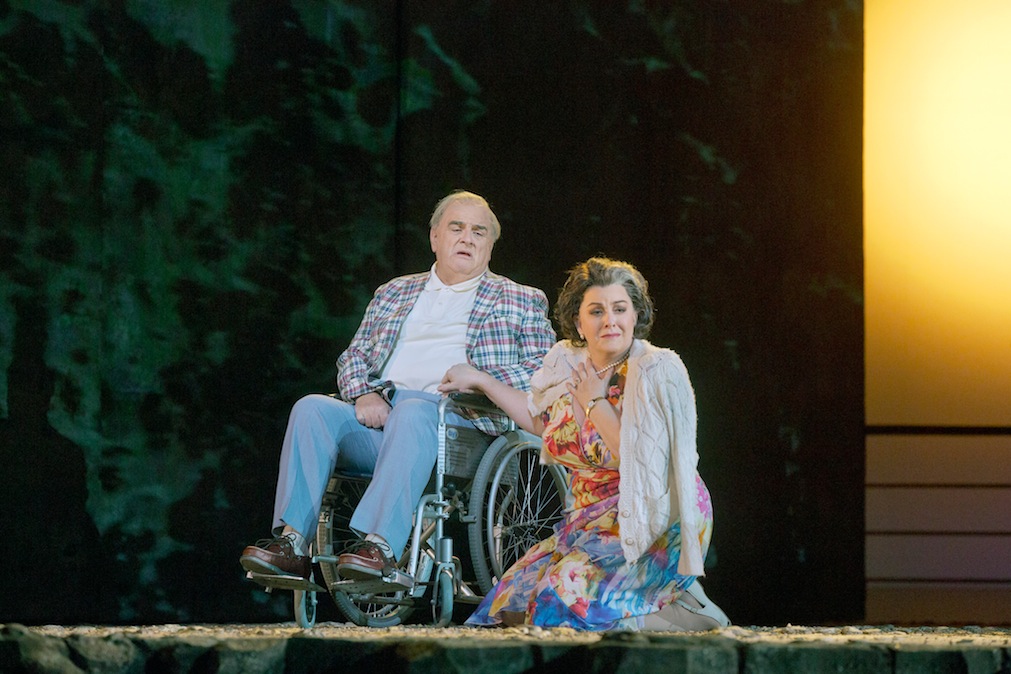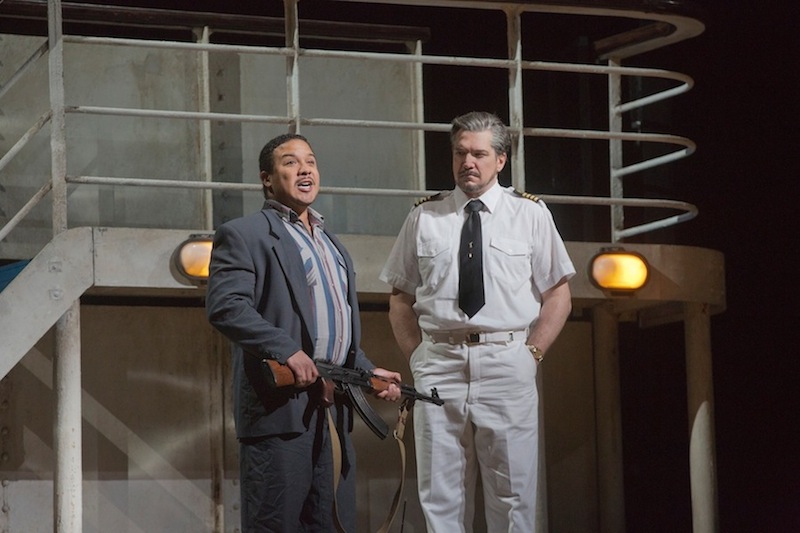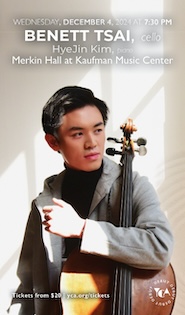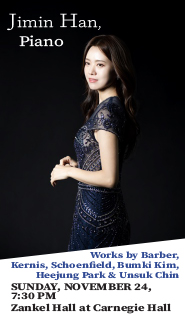Despite the protests and an uneven staging, Met’s powerful “Klinghoffer” makes a devastating impact

Alan Opie and Michaela Martens as Leon and Marilyn Klinghoffer in John Adams’ “The Death of Klinghoffer” at the Metropolitan Opera. Photo: Ken Howard
The loudest sound Monday night was the ovation for John Adams as he stepped on stage for a bow after the opening performance of his second opera, The Death of Klinghoffer, at the Metropolitan Opera House.
Seeing this opera once, or once again, produces a feeling of astonishment at all the vitriol it has inspired over the past dozen years and, especially, over the past four months in New York. While it is never hard to stir up hatred via gossip and distortion, this is not a crime or an injustice that has outraged people, but an opera.
A pre-performance rally of about 300 people, penned into the pedestrian space across Columbus Avenue from the Lincoln Center plaza, included prominent politicians, and some of the rhetoric was as violent and insulting as anything sung by the sadistic terrorist Rambo. A CUNY trustee seemed to be coyly encouraging violence in response to the production, other speakers called for revolution, and one compared Met general manager Peter Gelb to a German Jew happily attending concerts of Wagner while awaiting the Holocaust.
Inside the house, the show went on, though the curtain rose twenty minutes late due to the multiple lines, which snaked out into the plaza, of patrons picking up tickets and waiting to get in. The bag searches were more thorough than usual and there were uniformed policeman in and around the house.
Conductor David Robertson was greeted by a handful of boos on his entrance, but the nearly full house immediately drowned those out with applause. There were other attempts at disruption. One man monotonously repeated, “The murder of Klinghoffer will never be forgiven.” A woman shouted “Piece of shit!” at either the character Omar or the opera itself, but Robertson and the performers ignored them and keep the music going, while the audience drowned them out with applause.
Robertson earned that applause. He guided the score with clarity and firmness towards its devastating conclusion. In addition to some challenging syncopations and rhythmic patterns, there are stretches of mediocre and even outright bad music in The Death of Klinghoffer, which is not one of Adam’s most consistent scores. Yet Robertson set tempos that felt ideal and inevitable, and his terracing of dynamics and tempo changes were astonishingly smooth and subtle.
He held some of the intensity back from the conclusion of the opening “Chorus of the Exiled Palestinians,” and that had the effect of adding a ghostly melancholy to the “Chorus of the Exiled Jews” (which also wrong-footed the boo-birds, who voiced their objections as the Jews began to sing). The music and the excellent playing from the orchestra also held the production together through the static sections, like the after-the-fact narratives from the Captain and passengers that halt the action.

Aubrey Allicock as Mamoud and Paulo Szot as the Captain in “The Death of Klinghoffer.” Photo: Ken Howard
Baritone Paulo Szot brought vibrancy and presence to the difficult role of the Captain, who has to tell the story in retrospect, take part in the action, cooperate with, and work against the terrorists who hijack his cruise ship, the Achille Lauro. Along with his fine singing, Szot’s clear dramatic focus to every line made the character less of a faceless template, melded to each listener’s emotion, but a man with his own ideas and motivations. His Act I dialogue with Mamoud—bass-baritone Aubrey Allicock, in an excellent Met debut—was involving in exactly the way it is meant: to show that a man lives to wreak death and destruction is still a man, with his own ideas about beauty.
That is what disturbs many about Klinghoffer, that bad men get to sing. The power of the opera would be impossible without the contrast of the homicidal self-regard of the terrorists—especially Molqi (tenor Sean Panniker, shaky at first then steady) and Rambo, the terrific Ryan Speedo Green—and the normal if bourgeois decency of Leon and Marilyn Klinghoffer.
The part of Leon was created by Sanford Sylvan, and is being sung at the Met by Alan Opie, whose baritone is much darker and rougher than Sylvan’s gentle, silky voice. Opie is devastating in the role. His voice carries gravitas and meaning, and he projects a sound that is very much like that of an old man singing. He is earthy, real, and from the moment he is first heard in Act II, bitterly standing down the terrorists for their cowardice, explosive.
Mezzo-soprano Michaela Martens sings Marilyn, in a style that is richly operatic at first, then as direct and powerful as a flaming arrow shot into the chest when she rages over her husband’s murder.
This production is imported from the English National Opera, where it debuted in 2012. It comes from Tom Morris, also in his Met debut, and is straightforward, mostly competent, with flashes of brilliance and some bizarre and problematic touches. The bizarre mainly comes from choreographer Arthur Pita, who has the terrorist Omar break-dancing to soprano Maya Lahyani’s mesmerizing aria as the Palestinian Woman.
Tom Pye’s sets are simple: rocks and shrubs for the choral scenes in Palestine; ladders, railings and deck chairs for the ship. There are some serviceable back projections to provide a more expansive feeling, and, for the opening choruses, the years in which there have been wars over Israel run in sequence in the background. It’s a depressing litany of a contemporary Half-Hundred Years War.
The Met opera chorus sang beautifully throughout, their partnership with Robertson sensitive and responsive. In the smaller roles, the standout was soprano Kate Miller-Heidke, making her Met debut as the shallow British Dancing Girl: although her accent was more New Yawk than British, she added a nice Blossom Dearie quality to the role.
Morris places Klinghoffer downstage, back to the audience, sunning himself prior to his murder. This has the powerful effect of disconnecting the character from everyone, including the audience, and fills one with wrenching dread. But then Morris follows this up by explicitly showing the murder, an obviousness that actally flattens the drama, until Opie raised the evening to its height with his masterful singing of “The Aria of the Falling Body.”
Also, Morris’s conceit of having the terrorists and captive passengers wave to each other as the former disembark is troubling in the way it trivializes what has happened and what is to come. But his having the terrorists march proudly up the orchestra section aisle, to exit at the back of the house, is a brilliant provocation to the self-appointed censors who tried to prevent the Met from staging this work.
But the strength of the opera is in Adams’ music. The score is like an enormous arrow head, opening with diffuse feelings and structure, laying out conflict, morality and murder, inexorably moving to a point of abrading tragedy and insoluble moral outrage, with Marilyn Klinghoffer’s final words, “I wanted to die.” Her final aria bears witness to barbarism and the geopolitical accommodations that make people like Leon Klinghoffer expendable and meaningless to others. The point of the arrow is razor sharp, and on fire.
There were no boos at the end, only cheers for an opera that despairs at evil with more eloquence than any in the literature. The one outrageous shame is that the Met’s cancellation of the HD broadcast means that more people will not get a chance to experience The Death of Klinghoffer, a rare opera with the moral stance and seriousness of intent that its anti-democratic protesters vainly assert for themselves.
The Death of Klinghoffer continues through November 15. metopera.org




Posted Oct 21, 2014 at 5:19 pm by Susan Scheid
Like your preview piece before the opera, your review of the opera is the best I have read, assessing the surrounding controversy appropriately and judging the work on its merits in well-articulated and reasoned detail. For the sake of all of us, I’m glad you’re out there writing about music. Thank you.
Posted Oct 22, 2014 at 10:48 am by Carol Baron
What George Grella left out is that the dates he observed on the backdrop of the opening set of this new production were a last minute change that covered up threes sets of cities and dates that appear, even, on the publicity flyer for “Kilinghoffer”: 1943, Warsaw; 1992, Compton [Los Angeles]; and 2005, Bethlehem. The comparison of Israelis to the racists who provoked the Los Angeles race riots and to the racists of Nazi Germany is blatant.
Posted Oct 22, 2014 at 4:15 pm by David Josephson
Statement after statement in this screed is incorrect. Worst may be the blithe assertion that ” what disturbs many about Klinghoffer [is] that bad men get to sing.” That is nonsense: Iago sings at great length without eliciting angry protests against Verdi’s Otello; the assertion merely insults those who detest the opera for its slimy narrative and the poisonous politics it serves (see Carol Baron’s note above). The phrase “wars over Israel” is more nonsense. The roach in the kitchen, though, is the tiny word “if” in the phrase “the normal if bourgeois decency of Leon and Marilyn Klinghoffer.” That “if” tells us everything we need to know about the reviewer and his review.
Posted Oct 23, 2014 at 8:43 am by Doug
Break dancing? That’s a little confusing. Do other parts of the production borrow from different eras/cultures to establish a broader identity for the Palestinians?
Klinghoffer is probably my least favorite Adams opera (of the ones I’ve seen), but since I own the DVD I’m still pretty familiar with it. I was excited to see a different staging and compare some of the passages I don’t care for (I wouldn’t call them bad so much as awkward or dull). Thanks to the HD cancellation, I won’t have a chance.
The anger the protesters exhibit baffled me at first, but I’m starting to believe that these people had this anger before the opera’s announcement. This is just the bast target they have for their feelings, and they’re not going to waste that opportunity. It’s a proxy protest for some much broader conversation I don’t think the country is honestly having.